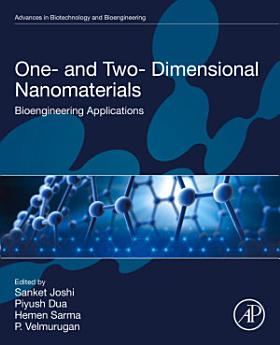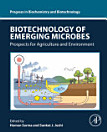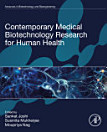One- and Two-Dimensional Nanomaterials: Bioengineering Applications
About this ebook
About the author
Dr. Sanket Joshi is currently a Professor at the Amity Institute of Microbial Technology, Amity University, Rajasthan, India. He has academic teaching and research experience of about 16 years, and industrial R&D experience of about 4 years in India and Oman. While working in Indian pharma companies, he undertook several turnkey projects. His current research interests encompass energy (In-situ/ex-situ microbial enhanced light/heavy oil recovery; chemical enhanced oil Recovery; biofuels), microbial products (biosurfactants, biopolymers, R&D and scale-up), and environmental bioremediation (crude oil pollution; analysis, mitigation and control of souring by Sulfate reducing bacteria; HPAM contaminated sites). He has about 125 scientific publications in international journals, book chapters, and conference proceedings, and two books to his credit. He is an Academic/Associate Editor for: Frontiers in Microbiology, PeerJ, Ecotoxicology (Springer), Petroleum Science and Technology (Springer), Biotech (Springer), and Open Biotechnology Journal; guest editor for Frontiers in Microbiology, Sustainability, Scientifica, and Open Biotechnology Journal.
Dr. Piyush Dua obtained his Ph.D. degree from Indian Institute of Technology, India, in 2005. After finishing his Doctorate, he has been engaged in teaching and research in various universities of repute in India, South Korea and Sultanate of Oman. He has published numerous articles in refereed journals of international repute including Journal of Biomedical Nanotechnology, International Journals of Nanotechnology, JPCC, Chemistry and Sustainability, Physica B, and more.
Dr. Hemen Sarma obtained his Ph.D. in Environmental Botany [2008] from Gauhati University and pursued post-doctorate research at North-Eastern Hill University, Shillong and Institute of Advanced Study in Science and Technology [IASST], Guwahati, India. Presently he is serving as Senior Assistant Professor at Nandanath Saikia College, Dibrugarh University, India. His research interest includes plant-microbe interactions, and microbial nanobiotechnology. He made significant contributions to the field of emerging contaminants, endocrine disrupting compounds and persistent organic pollutants. Dr. Sarma has more than 50 publications to his credit in peer-reviewed international journals.
Dr. Velmurugan is a Professor at the Centre for Material Engineering and Regenerative Medicine, Bharath Institute of Higher Education and Research, India. He has around 11 years of research and 3 years of teaching experience, in India and South Korea. His current research areas of interest are: Bionanomaterials, Quorum sensing, Biopigments, Probiotics, and Nanomaterials. He has worked as Assistant professor and Research professor in India and Chonbuk National university, South Korea. He serves as an editorial board member in: Frontiers in Microbiology (managing Guest Editor), Industrial Crops and Products (Elsevier), Microbiological Research, Journal of Advanced Pharmaceutical Science and Technology, EC Microbiology, Journal of Nanomaterials, International Journal of Modern Science and technology, and SF Journal of Biotechnology and Biomedical Engineering.






